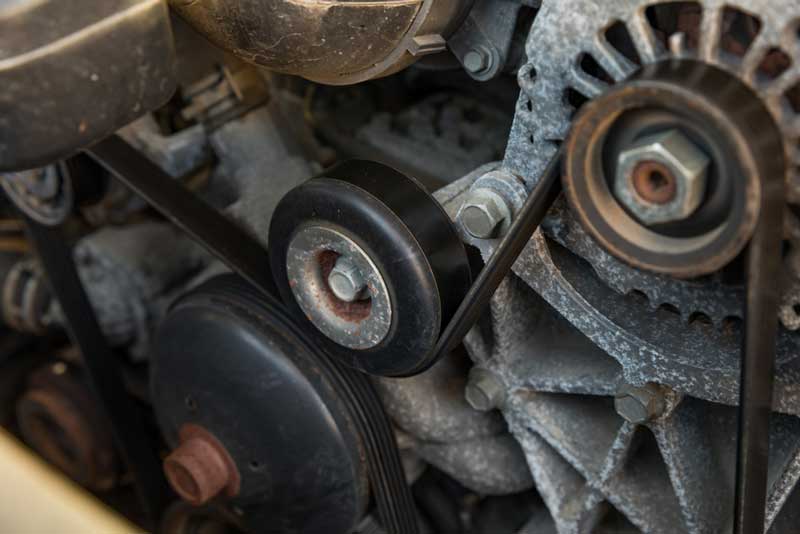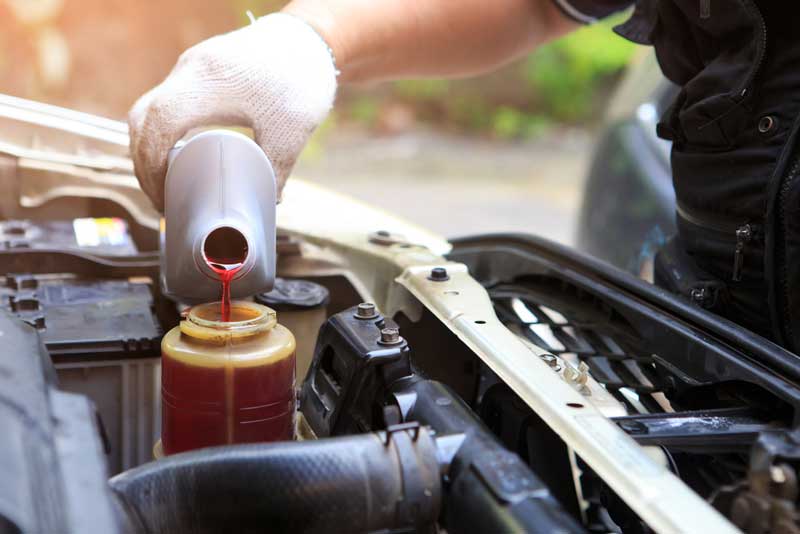Do you experience a whining noise when accelerating your car? Are you wondering where it is coming from? Would you want to find a solution to this issue?
Hearing high-pitched noises when your engine is running can be very irritating. However, many things could cause these repulsive sounds under the hood of your car.
We will examine these strange noises when accelerating. You will also learn how to troubleshoot and locate the origin of the whining noise.
Let’s get started!
What Causes Whining Noise When Accelerating?
Whining noise when accelerating is mostly caused by the transmission system, it can also result from low-power steering fluid or more serious damage like faulty alternator bearings, a broken piston, a bad water pump, or a malfunctioning AC compressor.
Here are some causes of whining noise when accelerating.
A Bad Serpentine Belt
Every component in a vehicle has a shelf life, including the serpentine belt. Once the shelf life is reached, the serpentine belt slips, cracks, or gets dried, making it unable to drive the pulleys on the engine properly.
This fault along the serpentine belt would cause increased friction whenever the belt drives any pulley, creating whining and squealing noises that could be very annoying.

There is Low Oil in the Engine Oil Reservoir
Whenever a whining noise is heard from under your vehicle’s hood, it is advisable to check if your engine oil is low. Low engine oil is a significant cause of high-pitched sound in the engine because the engine oil helps to lubricate and cool moving parts of the engine.
Low engine oil means increased friction. Increased friction means increased whining noises, and this inconvenience may lead to permanent engine damage if the issue is not rectified quickly enough.
A Clogged Transmission Filter
A clogged transmission filter will recreate the consequences of low transmission fluid. It will be impossible for transmission fluid to circulate the tranny. This lack of lubrication will increase friction, causing whining and grinding noises in the transmission whenever the accelerator pedal is pressed.
Also, if the car is neutral and idling, you will faintly hear the whining noise.
There is Low Transmission Fluid in the Reservoir
Leakages may cause a low transmission fluid within the transmission should understand that this could be dangerous as the transmission fluid helps cool and lubricate the tranny
With a low transmission, fluid friction increases within the tranny’s internal moving components; therefore, the whining and grinding noises will become more evident as you accelerate.
Planetary Gear Set may be Faulty
The planetary gear set helps the vehicle’s gear assembly to vary the output direction. Without this component, it will be impossible to increase output speed, reverse, decrease output speed, boost torque, and lower torque used for overdrive.
Once the planetary gear begins to wear, transmission whining noises would become more evident, significantly when increasing speed as you drive.
The Input Shaft Bearing is Worn
A worn input shaft bearing causes a vehicle to make whining noises when the engine is active, whether stationary, driving slowly, or at high speeds.
A faulty input shaft bearing is problematic in the car because the input shaft connects to the output shaft to rotate at varying speed ratios. If the shaft bearings are bad, these shafts can easily be dislodged and cause havoc to the transmission system.
The transmission Oil Pump is Bad
Once the transmission oil pump fails, you experience whining noises while driving.
You can also confirm that your transmission oil pump is failing when you find metal shavings at the base of the transmission crankcase; these metal shavings can block the transmission filter and cause leakages later.
A Bad Torque Converter
A faulty torque converter for automatic transmission vehicles will cause whining noises whenever you shift your gear into reverse or drive.
The Clutch or Flywheel is Worn
In manual transmission vehicles, whenever the clutch plates or flywheel begins to wear then, whining noises will also occur whenever the clutch is engaged.
The Throwout Bearing is Bad
A faulty throwout bearing would most likely cause whining noises in the transmission system, especially when the gear is not engaged, and the car is idling.
Usually, to confirm if you have a faulty throwout bearing, you will notice that the whining noises become more evident whenever you operate your clutch.
Faulty Steering Component
Steering components could also cause whining noises as you accelerate. Usually, if you want to confirm that the noise is coming from one of the steering components, you hear whining noises from your engine or closer to either of your wheels.
In addition, the power steering pump could also create squealing noises. When this happens, the power steering pump pulley is stuck, or the power steering fluid is low. The power steering fluid helps lubricate and cool the power steering.
Also, note that:
There can be other causes of whining noise when accelerating such as the wheels. If you hit the brakes at times, you will hear a loud squeal as the brake pads rub against the brake disc. If the brake caliper is faulty and does not return, the brake pad will continually latch onto the brake disc, causing a squealing noise as you accelerate.
The alternator can also cause whining noises whenever you accelerate if the pulley is loose or rusted.

Troubleshooting a Whining Noise When Accelerating?
Step 1: First, you need to rev the engine; however, ensure the vehicle is stationary, and every accessory is switched off. Closely listen to the rear of the engine and confirm if the sound is coming from beneath your hood.
Step 2: Start driving if you do not hear any sound. All windows must be sealed when doing this.
Step 3: Drive and listen carefully to your car. Also, remember to avoid any distractions.
Step 4: If you have no luck locating the origin of the whining sound, you could ask for help from a friend. Your friend can carefully stand by, listening to the sound coming from your vehicle as you slowly accelerate past your friend. This action will enable both of you to pinpoint the origin of the sound.
Also read: Transfer Case Leaks (Causes & Solution)
How to Fix Whining Noise When Accelerating
Transmission Whining Noises
Fix the whining noise when accelerating which is in the transmission system by refilling the fluid reservoir to enhance lubrication. Suppose the whining noise does not stop desperate confirmation that the sound is coming from the transmission system. It will be best to visit your local mechanic to get it fixed As soon as possible to avoid severe complications.
Steering Components Whining
To fix whining noises within your steering components, you can first troubleshoot and find the origin of the noise. If it comes from beneath the vehicle, you can confirm it from the steering rack whenever you turn the steering wheel. However, if it comes from the engine bay, your power steering pump might have an issue.
Fill up the power steering fluid reservoir to enhance lubrication and hydraulic action in the steering. If the whining noise does not stop, It will be best to visit your local mechanic to fix it as soon as possible to avoid severe complications.
Loose Belts or Pulleys Whining Noises
You could use WD-40 and spray on the pulley as the engine runs to fix the whining noises from those belts or pulleys. If the origin of the squealing is rust or dirt, then WD-40 will fix it.
However, you must visit your local mechanic to fit it back into place if it’s a loose pulley.
Alternator Whining Noises
To fix whining noises from the alternator, inspect the pulley, and if it has issues use WD-40 to lubricate it and clean off specks of dirt.
However, if whining noise comes from within the alternator, The alternator bearings are worn, and the alternator needs to be.
Also Read: Low Engine Oil Pressure (Causes & Solutions)
Frequently Asked Questions – Whining Noise When Accelerating
Can low transmission fluid cause a whining noise?
Low transmission fluid cause whining noises in any type of transmission system, whether automatic or manual. Where there is less lubrication, friction increases, and friction will lead to whining noises
What can cause a high-pitched whining noise in the car?
A worn-out brake pad pressing upon the brake disc as the car accelerates will cause a high-pitched whining noise.
What causes a high-pitched whine when accelerating?
A high-pitched squealing noise can be caused by either the serpentine belt having rust around it or the one brake pad pressing against the brake disc as the car accelerates.
Conclusion – Whining Noise When Accelerating
Whenever you experience whining noises from your vehicle, troubleshoot and find the origin of that noise. Once found, fix the issue immediately to avoid severe consequences later.
Finally, it is advisable to have adequate and timely repairs of various parts in your engine bay transmission and wheels. From time to time, also lubricate the bearings on your vehicle pulleys.

